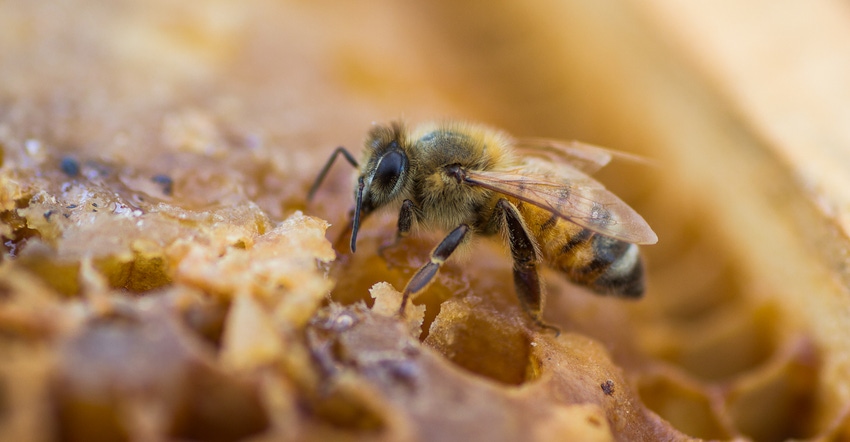March 14, 2018

A collaborative effort between various groups will study resistance issues in the Varroa mite, a troublesome pest for American beekeepers.
The Honey Bee Health Coalition will collaborate with an international team of 12 scientists to secure more than $475,000 in grant funds from the Foundation for Food and Agriculture Research to facilitate the testing of chemical compounds that could help beekeepers more effectively treat Varroa mite (Varroa destructor) infestations. This funding, matched by participants and industry members to provide more than $1 million in total support, also will document how mites develop resistance to such treatment.
The funding will support the identification, lab testing, and field testing over the next three years of “orphaned” chemical compounds that have acaricidal (miticide) activity but have not been specifically tested against Varroa mites. Many of these compounds are trapped in a bottleneck where the costs of testing and commercializing them are too steep for testing, effectively leaving them on the shelf.
“Varroa mite pose serious challenges to bees and hives,” says Steven Cook, Research Entomologist, USDA-ARS, Bee Research Lab. “This grant will provide critical support for the development and testing of new chemicals that could help beekeepers better manage Varroa mite infestations.”
The grant will provide crucial support for this $1.1 million effort, which is championed by national and international public, private, and NGO organizations, including USDA-ARS, University of Nebraska, Alberta Agriculture and Forestry Department (Canada), University of Georgia, Universitat de València (Spain), Ohio State University, and Auburn University.
In addition to the grant funding, Project Apis m. provided financial support. Other organizations also have provided in-kind support, including bees from regional beekeepers and compounds from Bayer.
“Varroa mites are rapidly adapting to treatments beekeepers currently use,” said Jennifer Berry, University of Georgia, Honey Bee Lab.
The Varroa mite, a parasite that attaches itself to honeybees, is one of the driving factors in recent colony losses, which threaten productive agriculture and the crops that rely upon commercial pollination services. Left untreated, a single infestation can wipe out colonies and spread rapidly across a region. Given the scale of these problematic parasites in North America, Europe, and around the world, the Coalition has worked to help beekeepers monitor and control Varroa mites through the development and dissemination of key resources and information.
In addition to this project, the Coalition has developed an expansive guide laying out best practices to detect, monitor, and control Varroa mite infestations. The Tools for Varroa Management Guide, is now in its sixth edition and has been downloaded by thousands of beekeepers across the United States and Canada — and as far away as New Zealand.
The Honey Bee Health Coalition brings together beekeepers, growers, researchers, government agencies, agribusinesses, conservation groups, manufacturers and brands, and other key partners to improve the health of honey bees and other pollinators. Its mission is to collaboratively implement solutions that will help to achieve a healthy population of honey bees while also supporting healthy populations of native and managed pollinators in the context of productive agricultural systems and thriving ecosystems. The Coalition is focusing on accelerating collective impact to improve honey bee health in four key areas: forage and nutrition, hive management, crop pest management, and communications, outreach, and education.
Through its unique network of private and public sector members, the Coalition fosters new partnerships, leverages existing efforts and expertise, and incubates and implements new solutions. The Coalition brings its diverse resources to bear in promoting communication, coordination, collaboration, and investment to strategically and substantively improve honey bee health in North America. Learn more at honeybeehealthcoalition.org.
The Honey Bee Health Coalition is a project of the Keystone Policy Center, a nationally recognized nonprofit working to find collaborative, actionable solutions to public policy challenges. Keystone operates under a statement of independence to serve its project participants. Learn more at keystone.org.
About the Author(s)
You May Also Like






